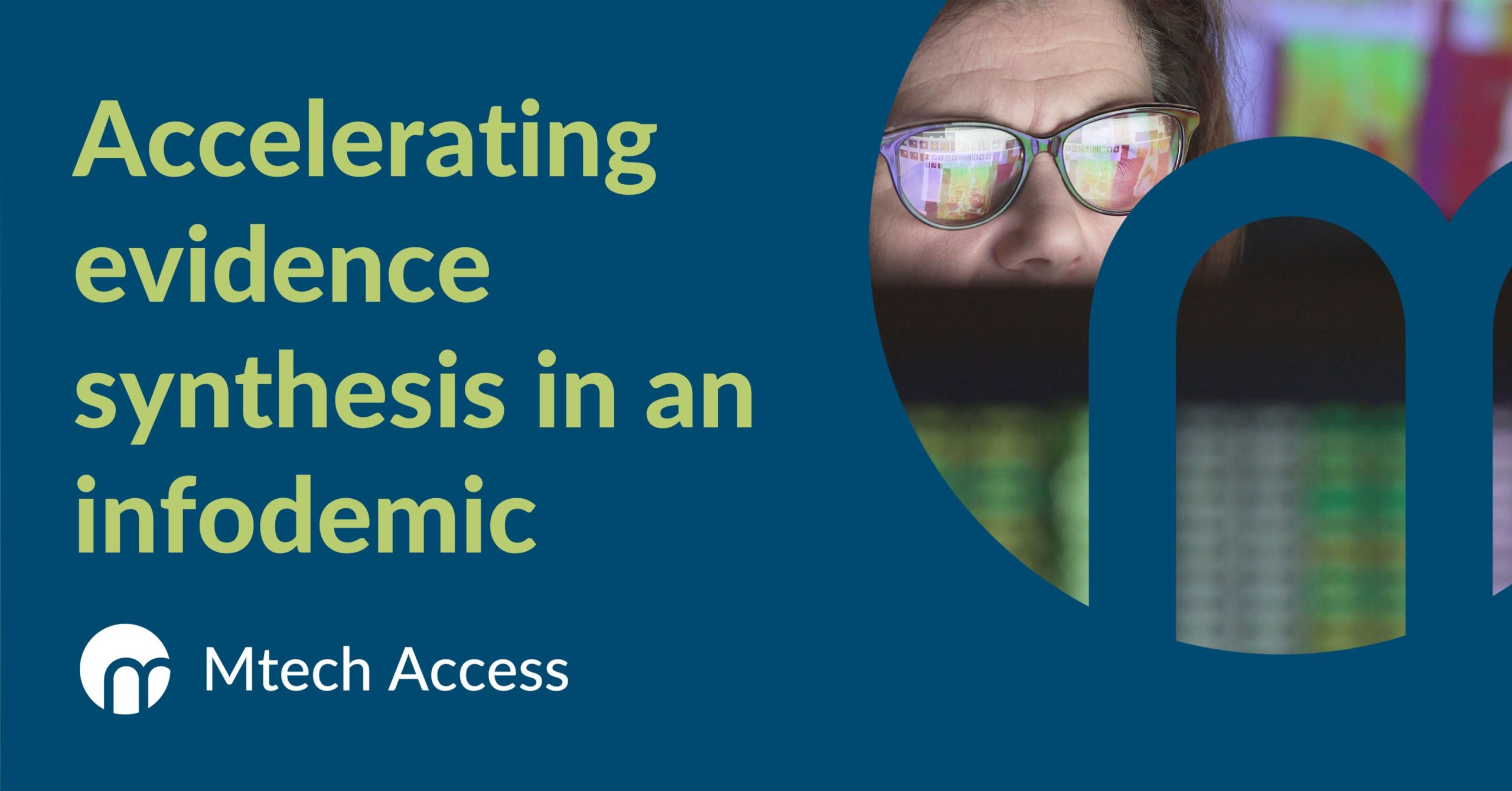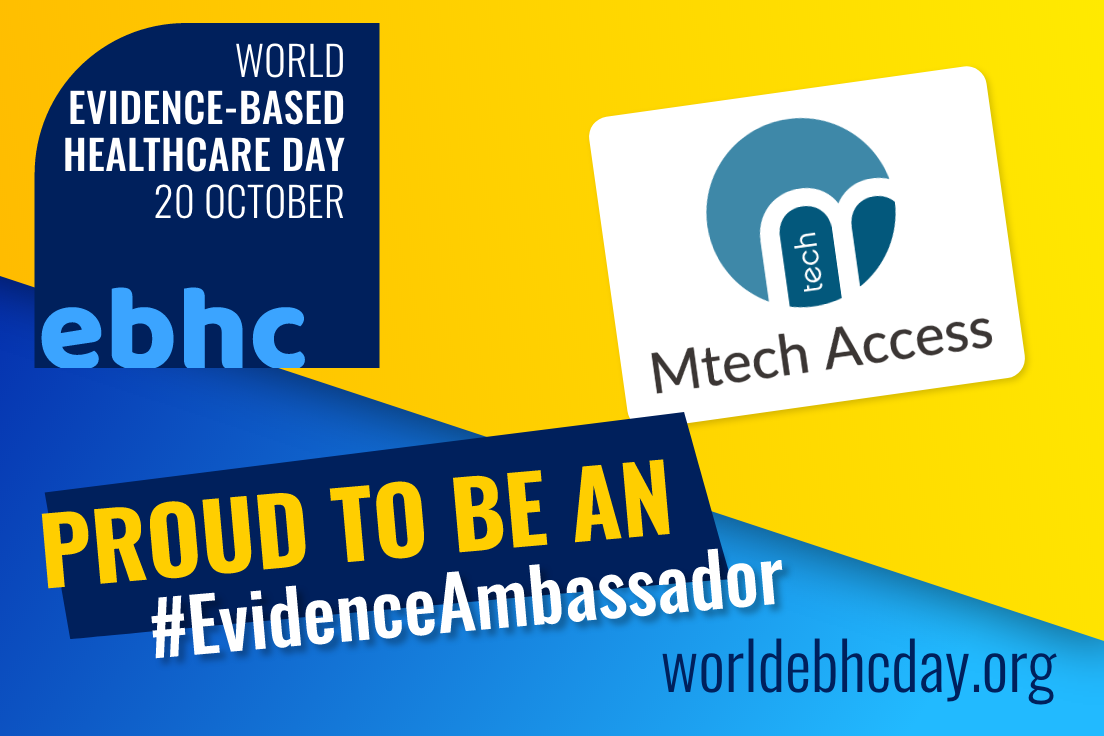
On World Evidence-Based Healthcare Day (20th October 2021), we explore the role of evidence in an infodemic and how evidence generation processes have been accelerated to offer rapid yet robust solutions.
What is an infodemic?
The COVID-19 pandemic kickstarted an unprecedented amount of clinical research and, as a consequence, led to a remarkable expansion in the number of clinical study reports being released into the scientific and public domains.
The sheer volume of data generated by these studies overwhelmed not just our clinical study infrastructure (for example, the World Health Organization [WHO] International Clinical Trials Registry Platform, used for searching and registering clinical trials, went offline for several months), but also our fact-checking infrastructure.
The gatekeeping process of peer reviewing research articles broke down, and poor-quality trials that provided oversized conclusions based on small sample sizes saturated the research space. In turn, the findings from these trials were picked up by news outlets without independent verification or critique. This created the first big wave of the COVID-19 infodemic that scientists have been battling to correct ever since.
According to the WHO, an infodemic is defined as “too much information, including false or misleading information, in digital and physical environments during a disease outbreak.” It is an overabundance of information, in both online and offline settings. Some of the information is accurate, but much of it can be mis- and dis-information.
This can cause confusion and lead to risk-taking that can harm health. It can also undermine the public health response and either intensify or lengthen disease outbreaks.
In this article, we consider how government and institution-occupying stakeholders can themselves be at risk of contributing to an infodemic. We will also discuss how Pharma and Medtech can best help leaders in healthcare mitigate these risks using evidence-based approaches.
Answering the un-answerable in an infodemic
In the fields of healthcare and life sciences, an evidence-based approach is critical to answering research and health questions using the most robust, high-quality data available. The core aim of evidence synthesis is to build an evidence base that is as comprehensive as possible, to answer each question that is important to patients and stakeholders, and to satisfy the concerns of patients and healthcare professionals before launching a new treatment.
In the past, the majority of people would remain unaware of emerging new treatments whilst there were still big questions that remained unanswered. However, during the COVID-19 pandemic, vaccines and treatments were discussed extensively on the news whilst they were still going through the process of clinical testing and Health Technology Assessments. Experts were asked the un-answerable while evidence was still being collated.
While scientists and healthcare professionals were not always able to provide conclusive answers, it could be argued that forcing any response may have contributed to the ambiguity and uncertainty felt by those not familiar with the research and market access process.
How did industry adapt to meet these challenges?
These challenges required streamlined, rapid approaches that did not compromise patient safety or public confidence, and were transparent and open about the limitations that such approaches introduced.
Industry explored a number of ways to accelerate the route to market for new treatments, diagnostics, and vaccines, whilst maintaining the highest levels of scientific rigour.
One option that our evidence generation team explored was how to quickly gather and synthesise evidence. This included using rapid review methodologies to generate systematic literature reviews.
Accelerating evidence synthesis with rapid reviews
Systematic literature reviews are a key part of the evidence generation process, where analysts create extensive research questions and specific protocols designed to bring together all the relevant studies pertaining to a new treatment while assessing the quality of the identified data.
Rapid reviews aim to condense this process, offering a more time- and cost-efficient methodology that is ultimately designed to ensure that treatments reach patients sooner. This was just one solution that the industry used to help accelerate the market access journey during the pandemic.
Rapid reviews streamline certain aspects of the review process, but still have systematic elements at their core. Typically, fewer data sources are searched, and less records may be assessed by multiple independent analysts. The quality of the included data may also not be judged.
However, there are also steps taken to offset these compromises. To mitigate against these shortfalls, a rapid review should:
- Be transparent, with a clearly documented methodology
- Critique the risk of bias in studies, if possible, so it is clear if there are limitations in the data
- Provide an open statement to reflect on whether the rapid review methodology may impact the findings
- Publish the protocol in an open access depository (such as PROSPERO) to ensure the work is not replicated unnecessarily and that the methods are critiqued early in the review process
This last point is particularly key in an infodemic. Research findings arising from a rapid review should also be published to prevent duplication of effort and ensure transparency of methodology. The use of open research repositories and registered reports, such as Open Research Europe, the Centre for Open Science and ScienceOpen, should be considered. This ensures that the methodology and the results can be published live and critiqued by the scientific community to ensure that data are of optimum quality.
In summary…
The use of rapid reviews is just one way in which industry has adapted to offer more timely evidence and enable a robust yet streamlined route to market for new treatments in the pandemic.
Industry has had to quickly find solutions for a range of challenges, not least how to communicate complex scientific evidence when this can easily be passed over in favour of more simplistic but inaccurate messages.
For Pharma and Medtech companies, the core approach continues to centre around ensuring healthcare professionals have the best information available to enable them to inform patients and the wider public about the risks and benefits of available and emerging treatments and technologies.
This article was also published on the World Evidence-Based Healthcare Day Blog and Mtech Access recognised as an evidence ambassador.
Mtech Access is a global market access and HEOR consultancy supporting Pharmaceutical, Diagnostic and Medtech companies with each step of their market access journey. This includes evidence synthesis, Health Technology Assessment submission, health economics and communication with healthcare customers.



